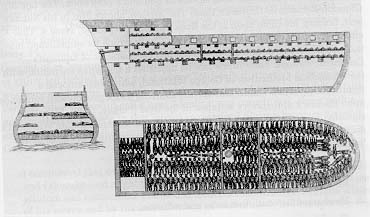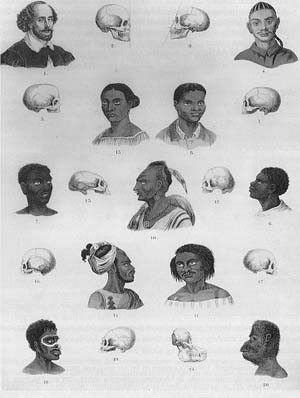Slavery and the Triangle trade (from Europe to Africa to Americas)
a. definition 1. societal institution
based on ownership, dominance, and exploitation of one human being by another
and reciprocal submission on the part of the person owned.
2. Members of family can be separated at the will of the owner.
3. Slavery at present--the selling of people or self-sale for
special purposes--e.g. prostitution; the outpouring of mainland Chinese
workers to places such as U.S. and Taiwan
b. the Triangle Trade:
1. route: from England, with merchandise such as weapons, ammunition,
metal, liquor, trinkets, and cloth, to the west Coast of Africa.
From Africa, with human cargo, to either West Indies or English colonies.
And then with agricultural products such as sugar back to England.
2. "Middle Passage" --
 Diagram of a middle passage slave ship, showing the
appalling conditions of transportation. Identity and Difference
323
Diagram of a middle passage slave ship, showing the
appalling conditions of transportation. Identity and Difference
323
 Drawings of the Middle Passage by Feelings
Drawings of the Middle Passage by Feelings
3. this trade is a source of wealth to tribal chiefs, to the
shipping business, to plantation owners in the South of U.S., and to merchants
and shipbuilders in the North.
4. An estimated 8 to 15 million Africans reached the Americas
from the 16th throught the 19 century, with a peak of about 6 million
arriving in the 18th century alone.
Replaced by Indentured Labour in the 19th
century
|

diagram from Sander Gilman's Difference and Pathology of racial/ethnic
classifications by physical charaacteristicss, such as cranial shape and
size.
Identity and Difference 308
|